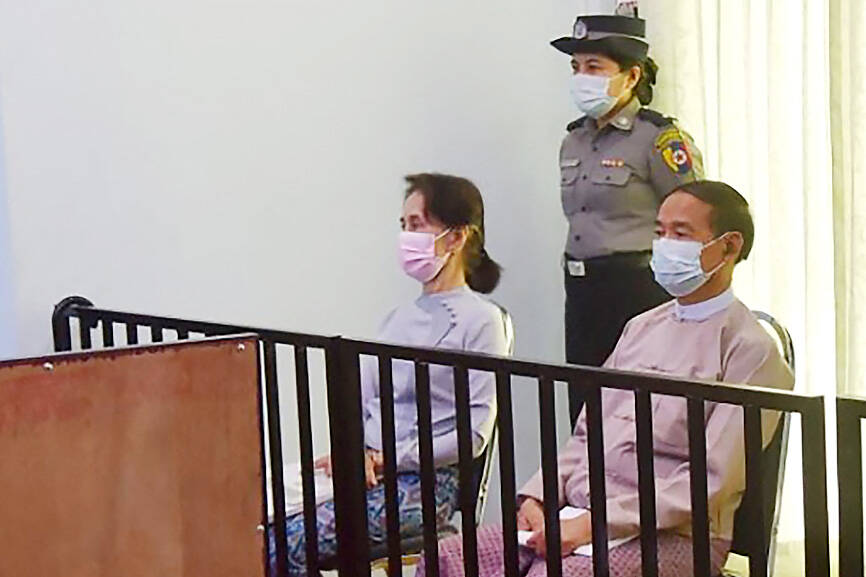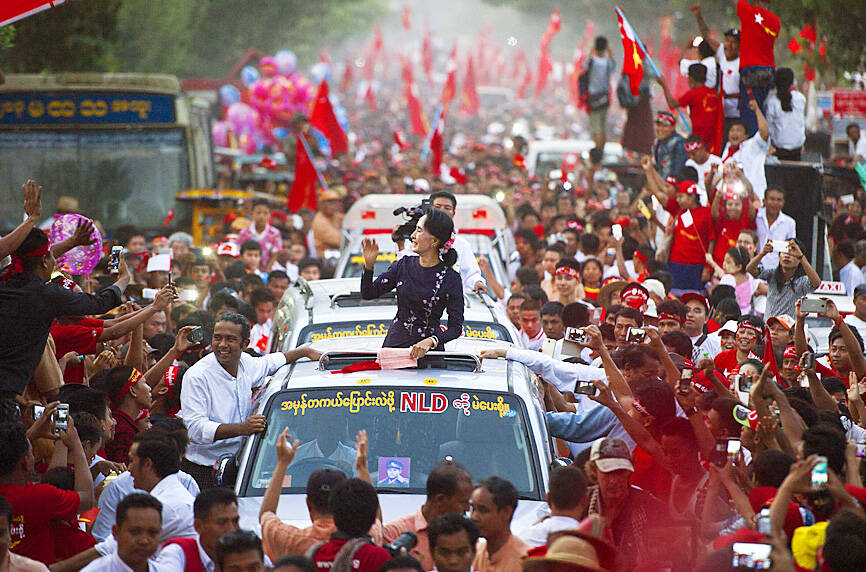Ousted Burmese state councilor Aung San Suu Kyi was sentenced to another seven years in jail as her long series of trials ended yesterday, with the Nobel laureate now facing more than three decades behind bars.
A prisoner of the military since a coup last year, Aung San Suu Kyi, 77, has been convicted on every charge leveled against her, ranging from corruption to illegally possessing walkie-talkies and flouting COVID-19 restrictions.
She was yesterday sentenced to an additional seven years in prison, on five counts of corruption related to hiring, maintaining and purchasing a helicopter for a Burmese government official, a case in which she allegedly caused “a loss to the state.”

Photo: AFP MYANMAR`S MINISTRY OF INFORMATION
Aung San Suu Kyi — sentenced to a total of 33 years following 18 months of court proceedings that rights groups called as a sham — appeared in good health, a legal source familiar with the case said.
“All her cases were finished and there are no more charges against her,” said the source, who requested anonymity as they were not authorized to speak to the media.
Journalists have been barred from the hearings, and Aung San Suu Kyi’s lawyers have been blocked from speaking to the media.

Photo: AFP
The road leading to the prison holding Aung San Suu Kyi in the military-built capital, Naypyidaw, was clear of traffic ahead of the verdict, an Agence France-Presse correspondent said.
Former Burmese president Win Myint, who was accused alongside Aung San Suu Kyi in the most recent trial, also received a seven-year sentence, the source said.
Since her trial began, Aung San Suu Kyi has been seen only once — in grainy state media photographs from a bare courtroom — and has been reliant on lawyers to relay messages to the world.
Many in Myanmar’s democracy struggle, which Aung San Suu Kyi has dominated for decades, have abandoned her core principle of nonviolence, with the opposition Burmese People’s Defense Forces clashing regularly with the military across the country.
Last week, the UN Security Council called on the junta to release Aung San Suu Kyi in its first resolution on the situation in Myanmar since the coup.
The corruption charges were “ridiculous,” said Htwe Htwe Thein, an associate professor at Curtin University in Australia.
“Nothing in Aung San Suu Kyi’s leadership, governance or lifestyle indicates the smallest hint of corruption,” she said.
“The question now will be what to do with Aung San Suu Kyi,” International Crisis Group senior Myanmar adviser Richard Horsey said. “Whether to allow her to serve out her sentence under some form of house arrest, or grant foreign envoys limited access to her. But the regime is unlikely to be in any rush to make such decisions.”
The military alleged widespread voter fraud during elections in November 2020 that were won resoundingly by Aung San Suu Kyi’s National League for Democracy (NLD), although international observers said the polls were largely free and fair.
The junta has since canceled the result and said it uncovered wide-spread voter fraud.
Aung San Suu Kyi’s convictions “aim to both permanently sideline her, as well as undermine and ultimately negate her NLD party’s landslide victory,” Human Rights Watch deputy Asia director Phil Robertson said.
Myanmar has been in turmoil since the coup, ending the its brief experiment with democracy and sparking huge protests. The junta has responded with a crackdown that rights groups say includes razing villages, mass extrajudicial killings and airstrikes on civilians.

CLASH OF WORDS: While China’s foreign minister insisted the US play a constructive role with China, Rubio stressed Washington’s commitment to its allies in the region The Ministry of Foreign Affairs (MOFA) yesterday affirmed and welcomed US Secretary of State Marco Rubio statements expressing the US’ “serious concern over China’s coercive actions against Taiwan” and aggressive behavior in the South China Sea, in a telephone call with his Chinese counterpart. The ministry in a news release yesterday also said that the Chinese Ministry of Foreign Affairs had stated many fallacies about Taiwan in the call. “We solemnly emphasize again that our country and the People’s Republic of China are not subordinate to each other, and it has been an objective fact for a long time, as well as

‘CHARM OFFENSIVE’: Beijing has been sending senior Chinese officials to Okinawa as part of efforts to influence public opinion against the US, the ‘Telegraph’ reported Beijing is believed to be sowing divisions in Japan’s Okinawa Prefecture to better facilitate an invasion of Taiwan, British newspaper the Telegraph reported on Saturday. Less than 750km from Taiwan, Okinawa hosts nearly 30,000 US troops who would likely “play a pivotal role should Beijing order the invasion of Taiwan,” it wrote. To prevent US intervention in an invasion, China is carrying out a “silent invasion” of Okinawa by stoking the flames of discontent among locals toward the US presence in the prefecture, it said. Beijing is also allegedly funding separatists in the region, including Chosuke Yara, the head of the Ryukyu Independence

GOLDEN OPPORTUNITY: Taiwan must capitalize on the shock waves DeepSeek has sent through US markets to show it is a tech partner of Washington, a researcher said China’s reported breakthrough in artificial intelligence (AI) would prompt the US to seek a stronger alliance with Taiwan and Japan to secure its technological superiority, a Taiwanese researcher said yesterday. The launch of low-cost AI model DeepSeek (深度求索) on Monday sent US tech stocks tumbling, with chipmaker Nvidia Corp losing 16 percent of its value and the NASDAQ falling 612.46 points, or 3.07 percent, to close at 19,341.84 points. On the same day, the Philadelphia Stock Exchange Semiconductor Sector index dropped 488.7 points, or 9.15 percent, to close at 4,853.24 points. The launch of the Chinese chatbot proves that a competitor can

‘VERY SHALLOW’: The center of Saturday’s quake in Tainan’s Dongshan District hit at a depth of 7.7km, while yesterday’s in Nansai was at a depth of 8.1km, the CWA said Two magnitude 5.7 earthquakes that struck on Saturday night and yesterday morning were aftershocks triggered by a magnitude 6.4 quake on Tuesday last week, a seismologist said, adding that the epicenters of the aftershocks are moving westward. Saturday and yesterday’s earthquakes occurred as people were preparing for the Lunar New Year holiday this week. As of 10am yesterday, the Central Weather Administration (CWA) recorded 110 aftershocks from last week’s main earthquake, including six magnitude 5 to 6 quakes and 32 magnitude 4 to 5 tremors. Seventy-one of the earthquakes were smaller than magnitude 4. Thirty-one of the aftershocks were felt nationwide, while 79